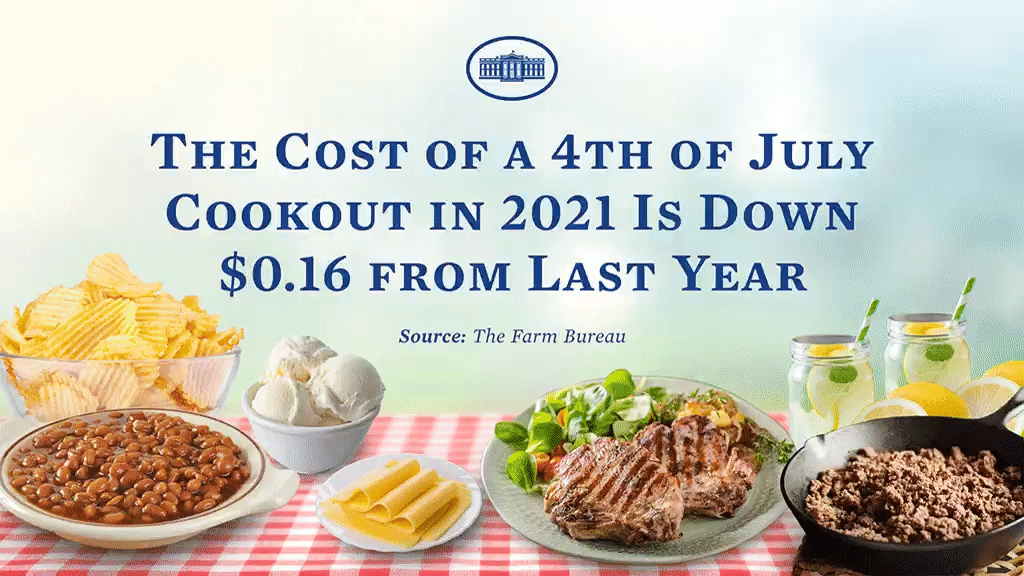How To Fight Inflation
Plus, a photo of my dog.
The internet is dunking on this tweet from the White House because it is, let there be no doubt, relentlessly corny.


I admit that "you saved 16 cents on your cookout" will not be my choice for a closing campaign argument in the summer of 2024. But it is a good sign about the way the Biden administration is thinking about inflation, however cringey the puns.
We tend to talk about inflation as a blunt mega-force that hits everything in the economy at once. Prices are rising, the prices, I say! And when inflation is really bad -- like triple-digit bad -- it can function that way. But most of the time, even when inflation is running at a pretty steady clip for several years, prices do not move in unison. Some go up, others don't, some even fall. It depends on what is causing the inflation and how families and businesses respond to it. This is why economists look at multiple metrics for inflation -- "core" inflation measures, for instance, exclude food and energy prices. What inflation number you get depends on which prices you include in your data.
The hottest Twitter fight in economics this summer has been over a stream of higher-than-expected inflation data. Are these price hikes a result of supply chain bottlenecks and disruptions associated with the pandemic? Or are they a sign that demand will outstrip supply for a sustained period of time, leading to a new inflationary era?
Different factions pick their favorite data, but the truth is we just don't know. The data can tell us what has already happened and give us a decent idea about where things might be going, but it can't predict the future. When we say inflation has been "higher than expected" this year, we are saying that most of the fancy, respected economic forecasters were wrong.
My own view is that this is mostly transitory stuff. I've seen the same data the hawks have seen, but I think the big price spikes in seemingly random places like lumber and used cars -- which have since cooled off -- suggest sector-specific problems rather than an economy-wide demand surge that the supply side can't accommodate. But I could be wrong. Jason Furman, for instance, thinks the higher inflation numbers in the U.S. relative to other countries is a sign that we're seeing something unique to U.S. supply and demand, since the pandemic happened everywhere. And the U.S. has had pretty low levels of both public and private investment for a long time, so there's some intuitive plausibility to that story.
But back to Joe Biden's corny cookout tweet. Wherever inflation is headed, it really matters which prices rise. And what the White House is emphasizing here is that even with "overall" inflation higher this year than we've seen in a while, the prices of a lot of stuff that ordinary families actually buy haven't moved much at all. The price of a cookout is actually down 16 cents year-over-year. That’s a good sign that the administration is focused on the right thing — what families are actually paying.
This matters both politically and substantively. Politically, it's important because nobody outside a very small population of nerds is paying attention to inflation reports. Most voters are working class. They aren't rebalancing their investment portfolios to hedge against the prospect of somewhat higher inflation over the next decade. The overwhelming majority of Americans will only think about inflation if they actually feel their purchasing power eroding. And with job openings soaring and wages showing pretty consistent growth (5.9% in the latest job report!) that hasn't happened yet for most households. So far, inflation isn’t a political drag.
Substantively, it matters because wherever prices go this year, an ideal Biden macroeconomic agenda would eventually result in some demand-driven inflation. You want to see so many workers getting jobs and raises that a little upward pressure on prices starts to materialize. Anything short of that means workers are being systematically excluded from the gains created by our economic system.
But you don't want sustained levels of high inflation on stuff that matters a lot to ordinary households. So at some point the question becomes how to manage price increases when they do in fact materialize. For the past 40 years, we've addressed this problem with interest rates -- a policy that works to contain inflation the way that amputations work to contain infections. You can definitely bring prices down by raising interest rates. In the process, you'll throw a bunch of people out of work through no fault of their own.
You often hear from hardcore inflation hawks that inflation is cruelest to the poor because the poor spend the highest percentage of their income on basic expenses. It's true so far as it goes, but everything cruel is cruelest to the poor -- that's what it means to be poor. And in the case of inflation, it's rarely obvious that some price increases aren't on balance a better deal for the poor than the job losses and wage stagnation that would result from tighter monetary policy.
But we do know which price increases are definitely very bad for working families. The biggest expense for most households is housing, which accounts for about 37 percent of what the average family takes home. The next biggest expense is transportation, claiming around 16 percent of the average family's budget. Married parents spend about 10 percent of their budget on childcare, while single parents spend a whopping 34 percent. Groceries, by contrast, are about 5 percent of the budget. You have to almost double supermarket prices to generate the same hit to a household balance sheet caused by a 10 percent jump in rent.
So a more precise way to fight the ravages of inflation would be to focus on the handful of costs that tend to really wreck families, instead of sucking demand out of the entire economy through higher interest rates. I'm agnostic on the question of how to do this -- sector-specific credit policy, subsidies, tax incentives, straight-up price controls, whatever. But some kind of inflation safety net for working people makes sense, and it doesn't have to go after all that many expenses to be effective.
The Biden team's tweet about Fourth of July cookouts isn't a call for a national rent stabilization program. But it does show that they aren't losing their heads over a few data reports and are thinking with some nuance about how inflation functions through the economy. And the administration's two major economic proposals -- the American Jobs Plan and the American Families Plan provide immediate relief on childcare and make some pretty serious long-term investments on housing and transportation that could help bring down those costs over the long term.
Of course, in the long run we are all dead. A smart supplement to this work would be a direct commitment to contain a few costs for working families no matter where the economy goes over the next couple of years.
Happy Fourth of July. Here’s a photo of Pepper playing baseball.


